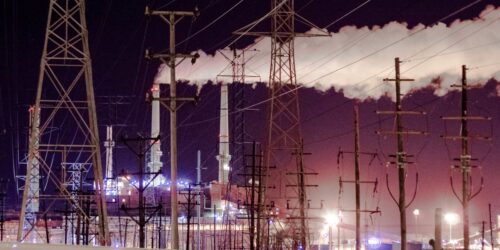Dulce Ortiz teared up during a virtual press conference as she recalled the family dinners and birthday celebrations she’s missed because of her dedication to the seemingly endless campaign to close the coal-fired power plant in Waukegan, Illinois.
The surprise announcement on June 17 that the plant will close in 2022 was bittersweet for Ortiz and other members of the group Clean Power Lake County. It came just after a sweeping state energy bill yet again failed to pass, leaving in doubt “just transition” provisions that Waukegan residents say are desperately needed to help their town economically weather the closure and begin to mitigate the environmental injustice they say the plant has caused.
The bill was widely expected to pass last week as the legislature had reconvened for a special session to consider it. But the Senate decided not to vote on the bill, reportedly because of opposition related to the impact on a $1.3 billion natural gas-fired plant under construction in downstate Grundy County.
The latest version of the bill was spearheaded by Gov. J.B. Pritzker and hashed out over many months by a wide range of stakeholders. It demands coal plants close by 2035 and gas plants by 2045, ratcheting down emissions on the way. It also increases funding for renewables at a level meant to achieve 100% clean energy by 2050 and 40% by 2030 — ideally jump-starting a solar market that had boomed and then stalled after incentives created by a 2017 law ran out.
J.C. Kibbey, clean energy advocate for the Natural Resources Defense Council, called the last-minute stalemate yet another “11th hour” roadblock put up by fossil fuel interests. The bill had previously been expected to pass during the final stretch of the state legislature’s regular session in May, but it failed in the final stretch because of opposition from backers of the Prairie State Energy Campus, Illinois’ largest coal plant. The revised bill allows Prairie State to remain open if it can capture and sequester 90% of its carbon emissions by 2034.
“This was the first anyone heard of it,” Kibbey said of the opposition related to the gas plant. “As bill drafts were out for months or years, [fossil fuel closure plans] should not have been a surprise to anyone. Whoever was raising that concern either didn’t understand the way the bill was structured or was trying to create a disruption.”
After the gas plant-related opposition arose, legislators clarified that the declining emissions caps would be aggregate, and the Illinois Environmental Protection Agency could decide to let some gas plants keep emitting more carbon while forcing others, especially in environmental justice communities, to ratchet down sooner. Kibbey and others said they are hopeful that given these measures, the legislature will reconvene again in the coming weeks and pass the bill. Kibbey said the Clean Jobs Coalition, which his organization is part of, backs the governor’s bill, which includes many components of the coalition’s own Clean Energy Jobs Act. However, Kibbey said he has questions about the economics and doesn’t want to see too much concession around emissions reduction plans.





